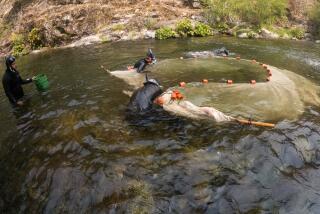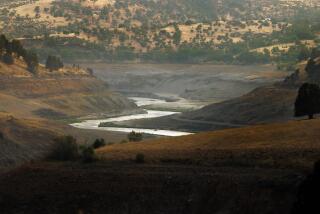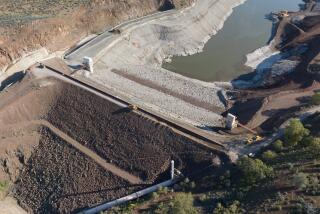Dam May Be Built : Thais Torn Over Fight to Preserve Forest
- Share via
THUNG YAI SANCTUARY, Thailand — “This is our last forest,” said ranger Veerawat Dheeraprasart, pointing down a deep river valley. “If the dam is built here, all this will vanish, and nobody will ever be able to replace it.”
Veerawat, the chief ranger of this rich wildlife sanctuary astride the border with Burma, is among thousands who have joined what has become perhaps the greatest environmental battle in Thailand’s history--a fight to persuade the government not to build a dam in Thailand’s last virgin forest.
In a country that once was jungle-carpeted and teeming with wildlife, it is rare today to see a tract of undisturbed forest, an unpolluted river, white-handed gibbons or free-ranging tigers.
Anti-dam groups have held rock concerts and demonstrations, some featuring life-like models of crucified animals, in their campaign.
Newspapers are probing the issue in unprecedented detail. Former Prime Minister Kukrit Pramoj says the government could face an uprising if it approves the Nam Choan dam.
The dam’s proponents say Nam Choan needs to be built, in what is the largest remaining area of protected forest in Southeast Asia, to increase Thailand’s energy supply by about 2%.
The Electric Generating Authority of Thailand has described the proposed, 580-megawatt dam as the “last possible exploitable source of hydropower” in the country. It says it will create a reservoir that would also help irrigate farm land and assure water supplies in times of drought.
The projected dam site is still hard to reach: a lurching, nine-hour drive over dirt roads from the capital of Bangkok, followed by a four-hour jungle trek. When monsoons lash the countryside, a three-day elephant ride offers the only access.
But dam opponents claim that construction of Nam Choan, with the necessary approach roads, facilities and ensuing human encroachment, would spell doom for what they say is also the last area in Thailand large enough to ensure the survival of a wide variety of wildlife.
Found in the Thung Yai and the adjacent Huay Kha Khaeng Sanctuary, an area about the size of Delaware, are large mammals, such as elephant, tiger and clouded leopard; some 350 species of birds, and a range of plant life. A number of the species are classified as endangered in Thailand, some worldwide.
Foreign conservation groups have written letters expressing concern to the Thai government. In December, Britain’s Prince Phillip, head of the World Wildlife Fund, urged an independent environmental impact study before a decision is reached. A similar plea came from more than 1,300 conservationists and scientists gathered at the Swiss-based International Union for Conservation of Nature and Natural Resources.
The Electric Generating Authority maintains that Nam Choan would degrade only 4% of the area. But ranger Veerawat, who has served for 10 years in the sanctuary, contends that the 47-mile-long dam reservoir would not only eradicate a biologically vital valley but also disrupt the migration routes of animals.
Opponents also dispute the 4% degradation estimate, saying that in Thailand roads built into remote, forested areas have inevitably been followed by massive logging, with collusion between businessmen and corrupt officials circumventing protective legislation.
The dam was first proposed in the early 1970s, but plans were shelved in 1983 in wake of protests and charges that environmental impact studies were sloppy.
In 1986, the Electric Generating Authority asked that the project be reconsidered and the government appointed a 40-member committee to come up with a decision, which is expected soon.
Some opponents believe government leaders will be impressed by their arguments that Thailand now has enough alternative energy sources to scrap the dam proposal.
Others, however, believe that too many key bureaucrats and politicians are still little concerned over environmental problems.
Another wildlife ranger, Sueb Nakhasathien, didn’t sound optimistic.
“Thais haven’t yet put a price on the environment,” he said. “They don’t realize that trees and water have a price, that wildlife has a price.”
More to Read
Sign up for Essential California
The most important California stories and recommendations in your inbox every morning.
You may occasionally receive promotional content from the Los Angeles Times.













